高中英语定语从句详解
- 格式:doc
- 大小:62.00 KB
- 文档页数:8
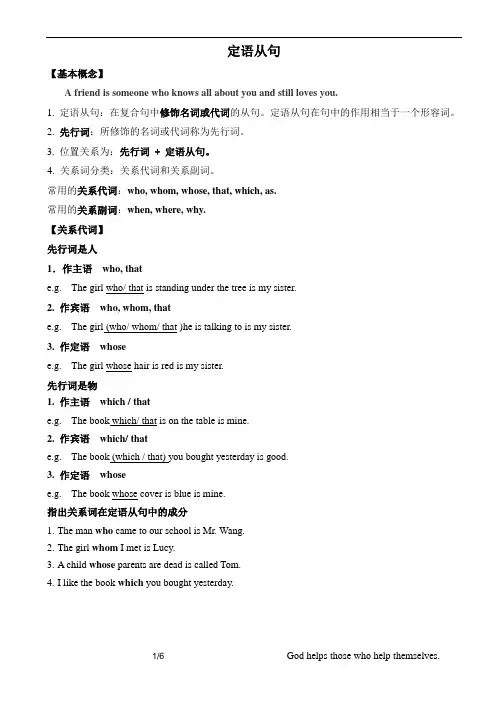
定语从句【基本概念】A friend is someone who knows all about you and still loves you.1. 定语从句:在复合句中修饰名词或代词的从句。
定语从句在句中的作用相当于一个形容词。
2. 先行词:所修饰的名词或代词称为先行词。
3. 位置关系为:先行词+定语从句。
4. 关系词分类:关系代词和关系副词。
常用的关系代词:who, whom, whose, that, which, as.常用的关系副词:when, where, why.【关系代词】先行词是人1.作主语who, thate.g. The girl who/ that is standing under the tree is my sister.2. 作宾语who, whom, thate.g. The girl (who/ whom/ that )he is talking to is my sister.3. 作定语whosee.g. The girl whose hair is red is my sister.先行词是物1. 作主语which / thate.g. The book which/ that is on the table is mine.2. 作宾语which/ thate.g. The book (which / that) you bought yesterday is good.3. 作定语whosee.g. The book whose cover is blue is mine.指出关系词在定语从句中的成分1.The man who came to our school is Mr. Wang.2.The girl whom I met is Lucy.3.A child whose parents are dead is called Tom.4.I like the book which you bought yesterday.总结:如何选用定语从句中的关系词1. 分清主句和定语从句2. 确定定语从句的先行词3. 把先行词带回到定语从句中去,看其在定语从句中做什么语法成分(主语,宾语,定语或状语)4. 若先行词在从句中作主语、宾语或定语则选择关系代词,若在从句中作状语,则选择关系副词。
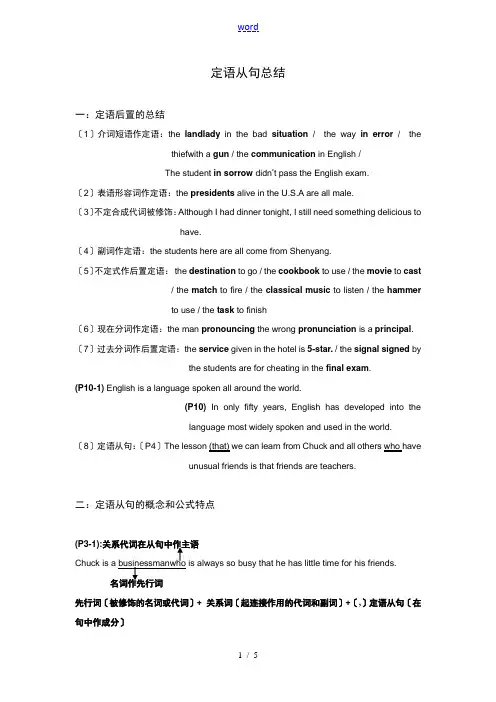
定语从句总结一:定语后置的总结〔1〕介词短语作定语:the landlady in the bad situation/ the way in error/ thethiefwith a gun / the communication in English /The student in sorrow didn’t pass the English exam.〔2〕表语形容词作定语:the presidents alive in the U.S.A are all male.〔3〕不定合成代词被修饰:Although I had dinner tonight, I still need something delicious tohave.〔4〕副词作定语:the students here are all come from Shenyang.〔5〕不定式作后置定语:the destination to go / the cookbook to use / the movie to cast/ the match to fire / the classical music to listen / the hammerto use / the task to finish〔6〕现在分词作定语:the man pronouncing the wrong pronunciation is a principal. 〔7〕过去分词作后置定语:the service given in the hotel is 5-star. / the signal signed bythe students are for cheating in the final exam.(P10-1) English is a language spoken all around the world.(P10) In only fifty years, English has developed into thelanguage most widely spoken and used in the world.〔8〕定语从句:〔P4〕The lesson (that) we can learn from Chuck and all others who haveunusual friends is that friends are teachers.二:定语从句的概念和公式特点(P3-1):关系代词在从句中作主语Chuck is a businessmanwho is always so busy that he has little time for his friends.先行词〔被修饰的名词或代词〕+ 关系词〔起连接作用的代词和副词〕+〔,〕定语从句〔在句中作成分〕三:定语从句的分类When I took the money from her grandfather, I looked back at the girl, who was giving me the prettiest, largest smile (that)I have ever seen.限定性定语从句和非限定性定语从句的区别1:限定性没有逗号,非有逗号。
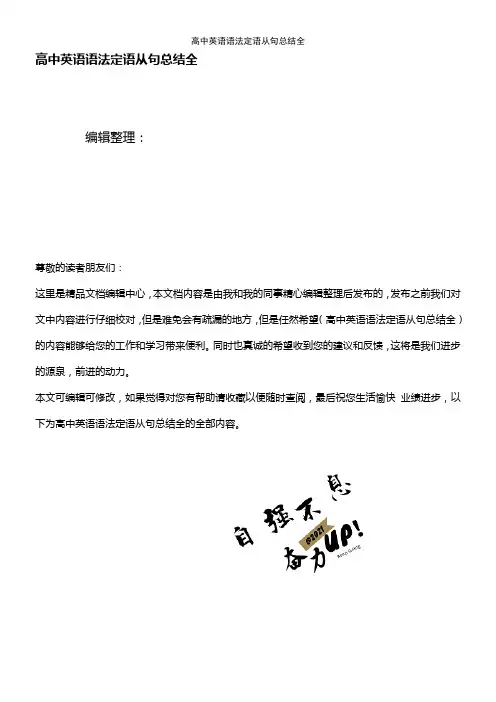
高中英语语法定语从句总结全编辑整理:尊敬的读者朋友们:这里是精品文档编辑中心,本文档内容是由我和我的同事精心编辑整理后发布的,发布之前我们对文中内容进行仔细校对,但是难免会有疏漏的地方,但是任然希望(高中英语语法定语从句总结全)的内容能够给您的工作和学习带来便利。
同时也真诚的希望收到您的建议和反馈,这将是我们进步的源泉,前进的动力。
本文可编辑可修改,如果觉得对您有帮助请收藏以便随时查阅,最后祝您生活愉快业绩进步,以下为高中英语语法定语从句总结全的全部内容。
高中英语定语从句详解Ⅰ. 概念:(1)定语从句:在主从复合句中用作定语的从句叫定语从句。
定语从句一般紧接在先行词(antecedent)后面。
(2) 先行词:被定语从句修饰的成份.先行词可以为一个词,短语,或整个主句。
(3) 引导定语从句的词叫关系词,分为关系代词和关系副词。
关系词的作用:1)引导定语从句,连接主句和从句,相当于一个连词;2) 必在从句中作某个句子成份(可以做主语,宾语,表语,定语,状语)常用的关系代词: that、 which、 who、whom、whose,当关系代词在定语从句中做宾语时,关系代词可以省略。
常用的关系副词(在从句中只作状语): when(时间状语)、why(原因状语)、 where(地点状语)可以修饰人的关系代词:that, who, whom, whose可以修饰事的关系代词:that, which, as, whose,The student who answered the question was John。
I know the reason why he was so angry。
The boy (whom) you are talking to is my brother.I’d like a room whose window faces the sea。
定语从句三步:第一找出先行词;第二看先行词在定语从句中的语法功能(做主语、宾语、表语或状语);第三选择合适的关系词。
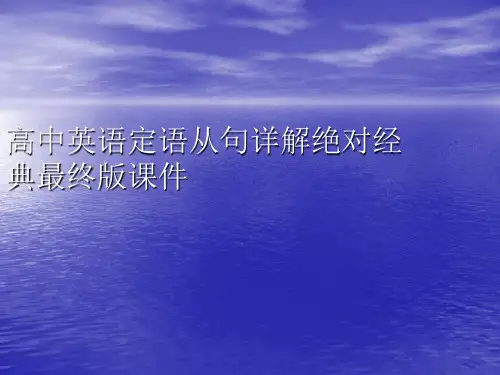
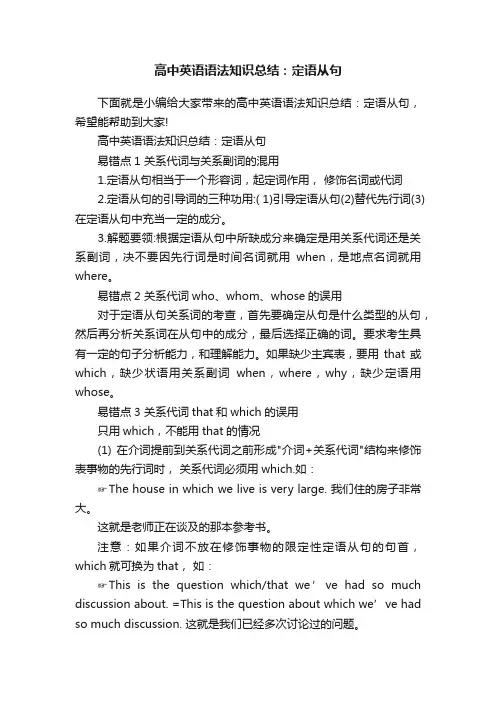
高中英语语法知识总结:定语从句下面就是小编给大家带来的高中英语语法知识总结:定语从句,希望能帮助到大家!高中英语语法知识总结:定语从句易错点1 关系代词与关系副词的混用1.定语从句相当于一个形容词,起定词作用,修饰名词或代词2.定语从句的引导词的三种功用:( 1)引导定语从句(2)替代先行词(3)在定语从句中充当一定的成分。
3.解题要领:根据定语从句中所缺成分来确定是用关系代词还是关系副词,决不要因先行词是时间名词就用when,是地点名词就用where。
易错点2 关系代词who、whom、whose的误用对于定语从句关系词的考查,首先要确定从句是什么类型的从句,然后再分析关系词在从句中的成分,最后选择正确的词。
要求考生具有一定的句子分析能力,和理解能力。
如果缺少主宾表,要用that或which,缺少状语用关系副词when,where,why,缺少定语用whose。
易错点3 关系代词that和which的误用只用which,不能用that的情况(1) 在介词提前到关系代词之前形成"介词+关系代词"结构来修饰表事物的先行词时,关系代词必须用which.如:☞The house in which we live is very large. 我们住的房子非常大。
这就是老师正在谈及的那本参考书。
注意:如果介词不放在修饰事物的限定性定语从句的句首,which就可换为that,如:☞This is the question which/that we’ve had so much discussion about. =This is the question about which we’ve had so much discussion. 这就是我们已经多次讨论过的问题。
(2) 先行词为"those+表事物的复数名词"时,关系代词通常只用which而不用that。
如:☞Students should keep in mind those regulations which restrict their behavior.学生应牢记那些规范自己的行为准则。
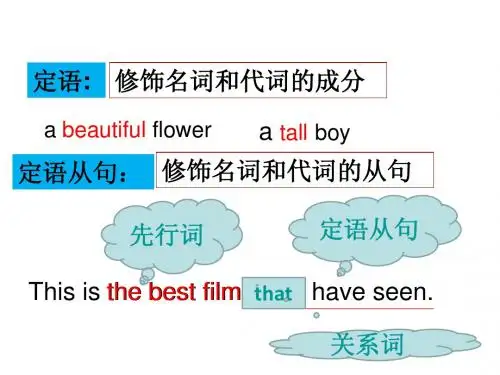
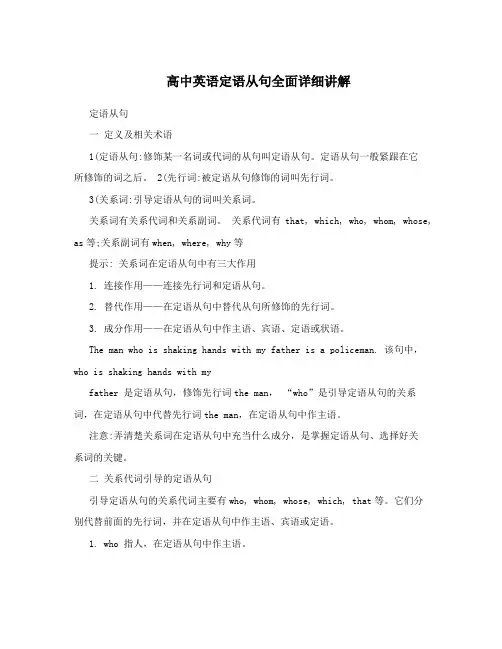
高中英语定语从句全面详细讲解定语从句一定义及相关术语1(定语从句:修饰某一名词或代词的从句叫定语从句。
定语从句一般紧跟在它所修饰的词之后。
2(先行词:被定语从句修饰的词叫先行词。
3(关系词:引导定语从句的词叫关系词。
关系词有关系代词和关系副词。
关系代词有that, which, who, whom, whose, as等;关系副词有when, where, why等提示: 关系词在定语从句中有三大作用1. 连接作用——连接先行词和定语从句。
2. 替代作用——在定语从句中替代从句所修饰的先行词。
3. 成分作用——在定语从句中作主语、宾语、定语或状语。
The man who is shaking hands with my father is a policeman. 该句中,who is shaking hands with myfather 是定语从句,修饰先行词the man,“who”是引导定语从句的关系词,在定语从句中代替先行词the man,在定语从句中作主语。
注意:弄清楚关系词在定语从句中充当什么成分,是掌握定语从句、选择好关系词的关键。
二关系代词引导的定语从句引导定语从句的关系代词主要有who, whom, whose, which, that等。
它们分别代替前面的先行词,并在定语从句中作主语、宾语或定语。
1. who 指人,在定语从句中作主语。
The boys who are playing football are from Class One. 正在踢足球的男孩是一班的。
Yesterday I helped an old man who had lost his way. 昨天我帮助了一位迷路的老人。
That is the teacher who teaches us physics. 那就是教我们物理的老师。
. whom 指人,在定语从句中做宾语,常可省略,在口语或非正式文体中常可用who 来代替。
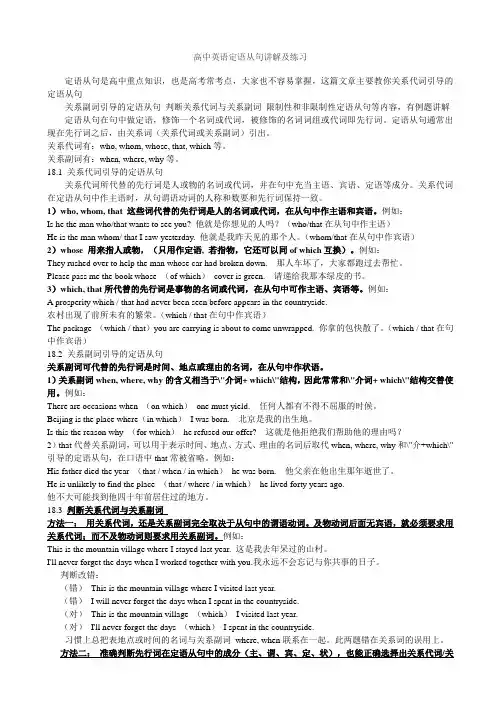
高中英语定语从句讲解及练习定语从句是高中重点知识,也是高考常考点,大家也不容易掌握,这篇文章主要教你关系代词引导的定语从句关系副词引导的定语从句判断关系代词与关系副词限制性和非限制性定语从句等内容,有例题讲解定语从句在句中做定语,修饰一个名词或代词,被修饰的名词词组或代词即先行词。
定语从句通常出现在先行词之后,由关系词(关系代词或关系副词)引出。
关系代词有:who, whom, whose, that, which等。
关系副词有:when, where, why等。
18.1 关系代词引导的定语从句关系代词所代替的先行词是人或物的名词或代词,并在句中充当主语、宾语、定语等成分。
关系代词在定语从句中作主语时,从句谓语动词的人称和数要和先行词保持一致。
1)who, whom, that 这些词代替的先行词是人的名词或代词,在从句中作主语和宾语。
例如:Is he the man who/that wants to see you? 他就是你想见的人吗?(who/that在从句中作主语)He is the man whom/ that I saw yesterday. 他就是我昨天见的那个人。
(whom/that在从句中作宾语)2)whose 用来指人或物,(只用作定语, 若指物,它还可以同of which互换)。
例如:They rushed over to help the man whose car had broken down.那人车坏了,大家都跑过去帮忙。
Please pass me the book whose (of which)cover is green.请递给我那本绿皮的书。
3)which, that所代替的先行词是事物的名词或代词,在从句中可作主语、宾语等。
例如:A prosperity which / that had never been seen before appears in the countryside.农村出现了前所未有的繁荣。
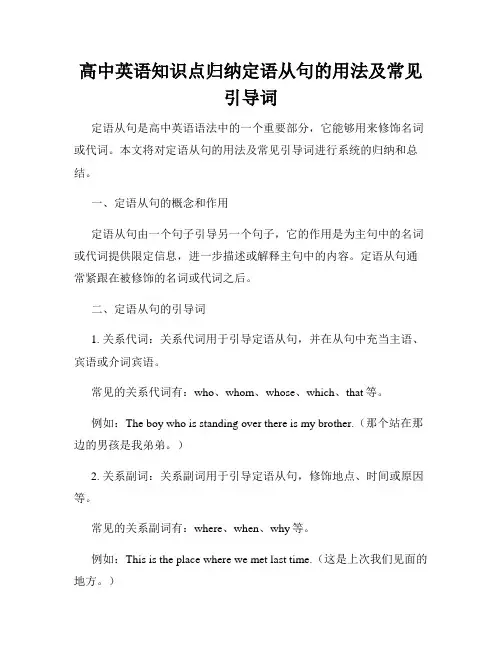
高中英语知识点归纳定语从句的用法及常见引导词定语从句是高中英语语法中的一个重要部分,它能够用来修饰名词或代词。
本文将对定语从句的用法及常见引导词进行系统的归纳和总结。
一、定语从句的概念和作用定语从句由一个句子引导另一个句子,它的作用是为主句中的名词或代词提供限定信息,进一步描述或解释主句中的内容。
定语从句通常紧跟在被修饰的名词或代词之后。
二、定语从句的引导词1. 关系代词:关系代词用于引导定语从句,并在从句中充当主语、宾语或介词宾语。
常见的关系代词有:who、whom、whose、which、that等。
例如:The boy who is standing over there is my brother.(那个站在那边的男孩是我弟弟。
)2. 关系副词:关系副词用于引导定语从句,修饰地点、时间或原因等。
常见的关系副词有:where、when、why等。
例如:This is the place where we met last time.(这是上次我们见面的地方。
)三、限制性定语从句和非限制性定语从句1. 限制性定语从句:限制性定语从句用来对先行词进行限定,如果去掉它,主句的意思就不完整,从句不能省略。
例如:The book that I bought yesterday is very interesting.(我昨天买的那本书非常有趣。
)2. 非限制性定语从句:非限制性定语从句用来对先行词进行补充或说明,如果去掉它,主句的意思仍然完整,从句用逗号隔开。
例如:Tom, who is my best friend, will come to my birthday party.(汤姆,我的好朋友,会来参加我的生日派对。
)四、定语从句的位置定语从句通常紧跟在被修饰的名词或代词之后,可以放在句首、句中或句末。
例如:The woman who is talking to the teacher is my mother.(正在和那个老师谈话的女人是我妈妈。
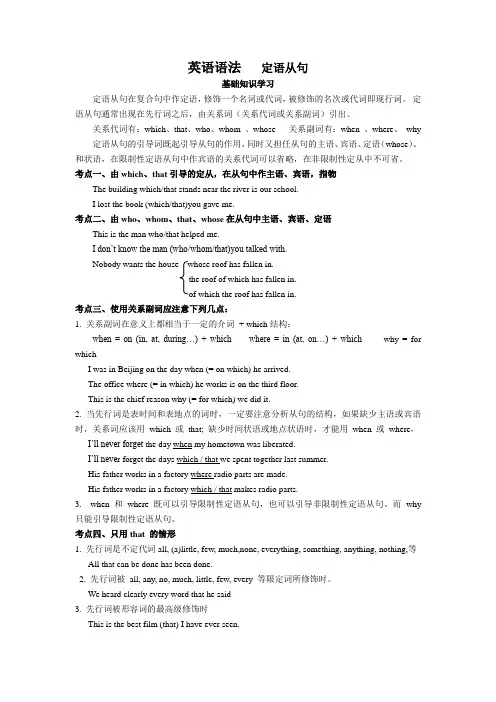
英语语法定语从句基础知识学习定语从句在复合句中作定语,修饰一个名词或代词,被修饰的名次或代词即现行词。
定语从句通常出现在先行词之后,由关系词(关系代词或关系副词)引出。
关系代词有:which、that、who、whom 、whose 关系副词有:when 、where、why 定语从句的引导词既起引导从句的作用,同时又担任从句的主语、宾语、定语(whose)、和状语,在限制性定语从句中作宾语的关系代词可以省略,在非限制性定从中不可省。
考点一、由which、that引导的定从,在从句中作主语、宾语,指物The building which/that stands near the river is our school.I lost the book (which/that)you gave me.考点二、由who、whom、that、whose在从句中主语、宾语、定语This is the man who/that helped me.I don’t know the man (who/whom/that)you talked with.Nobody wants the house whose roof has fallen in.the roof of which has fallen in.of which the roof has fallen in.考点三、使用关系副词应注意下列几点:1. 关系副词在意义上都相当于一定的介词+ which结构:when = on (in, at, during…) + which where = in (at, on…) + which why = for whichI was in Beijing on the day when (= on which) he arrived.The office where (= in which) he works is on the third floor.This is the chief reason why (= for which) we did it.2. 当先行词是表时间和表地点的词时,一定要注意分析从句的结构,如果缺少主语或宾语时,关系词应该用which 或that; 缺少时间状语或地点状语时,才能用when 或where,I’ll never forget the day when my hometown was liberated.I’ll neve r forget the days which / that we spent together last summer.His father works in a factory where radio parts are made.His father works in a factory which / that makes radio parts.3. when 和where 既可以引导限制性定语从句,也可以引导非限制性定语从句。
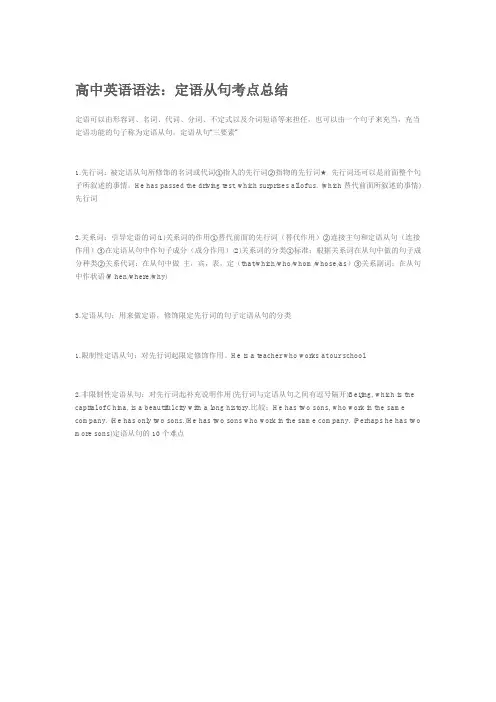
高中英语语法:定语从句考点总结定语可以由形容词、名词、代词、分词、不定式以及介词短语等来担任,也可以由一个句子来充当,充当定语功能的句子称为定语从句。
定语从句“三要素”1.先行词:被定语从句所修饰的名词或代词①指人的先行词②指物的先行词★先行词还可以是前面整个句子所叙述的事情。
He has passed the driving test, which surprises all of us. (which替代前面所叙述的事情) 先行词2.关系词:引导定语的词(1)关系词的作用①替代前面的先行词(替代作用)②连接主句和定语从句(连接作用)③在定语从句中作句子成分(成分作用)(2)关系词的分类①标准:根据关系词在从句中做的句子成分种类②关系代词:在从句中做主,宾,表,定(that/which/who/whom/whose/as)③关系副词:在从句中作状语(When/where/why)3.定语从句:用来做定语,修饰限定先行词的句子定语从句的分类1.限制性定语从句:对先行词起限定修饰作用。
He is a teacher who works at our school.2.非限制性定语从句:对先行词起补充说明作用(先行词与定语从句之间有逗号隔开)Beijing, which is the capital of China, is a beautiful city with a long history.比较:He has two sons, who work in the same company. (He has only two sons.)He has two sons who work in the same company. (Perhaps he has two more sons)定语从句的10个难点1.关系代词的省略(限定性定语从句)(1)关系代词在定语从句中作宾语She is the girl (whom / that) I loved before. (可以省略whom/that)(2)关系代词在定语从句中作表语He is no longer the boy (that) he used to be. (可以省略that)(3)关系代词作介词宾语,介词在从句句尾时可以省略Housing price is a problem (that/which) people are interested in.比较:Housing price is a problem in which people are interested.(此时只能用which且不能省略)2.先行词是人(that/who的区别)(1)用that的情况①以疑问词who开头的句子中Who is the man that is shouting there?②关系代词在从句中作表语时She is not the girl that she used to be.③先行词被the very, the right, the only修饰This is the very person that we are looking for.(2)用who的情况①先行词是one, ones, anybody, all, none, those 等Those who want to go to the cinema will have to wait at the gate of the school.②句子中有两个定语从句,一个用了that,另外一个用whoWho is the boy that won the gold medal?③在there be 结构中There are many young men who are against him.④在非限定性定语从句当中Tom, who is my best friend, has gone abroad to study.3.先行词是物(that / which的区别)(1)用which的情况①在非限定性定语从句中She lost the game, which depressed her greatly.②关系词置于介词之后,作宾语The pen with which you write is Jack’s.③先行词是that或定语从句中套定语从句,一个关系词用that,另一个用which.Let me show you the novel that I borrowed from the library which is newly open to us.(2)用that的情况①先行词是不定代词如all, little, few, much,anything, everything, nothing, none, no one 等She did all that she could to help us.②先行词被all, every, no, some, little, much, the only, he very, the right,the last等所修饰时This is the very book that I want.③先行词中既有人又有物时She described in her compositions the people and he places that impressed her most.④先行词前有序数词或形容词最高级修饰时This is the best book that I have ever read.This is the first film that I’ve seen since I came here.⑤定语从句中套定语从句,其中一个关系词以用which, 另外一个用thatHe built a factory which produced things that had never been seen before.⑥当主句的主语是疑问词which,另一个用thatWho is the person that is standing at the gate?4.As引导定语从句用法(1)As 既可以引导限制性定语从句也可以用于非限定性定句中充当主语,宾语,表语等。
定语从句用法详解英语句子中用来修饰名词、代词或句子的从句叫做定语从句。
定语从句在句子中的作用相当于形容词,因此也被称为形容词性从句,它可以用来修饰一个名词或代词,也可用来修饰句子中的某个短语,甚至整个句子。
1.被定语从句修饰的词称为先行词。
2.引导定语从句的词被称为关系词,它包括关系代词和关系副词两种。
I 定语从句中关系词的分类及用法关系词不仅在先行词与定语从句之间起连接作用,而且作从句中的一个成分。
关系词例词所修饰的先行词在从句中所作成分省略情况关系代词who 人主语、宾语作宾语时可省略关系代词whom 人宾语可省略关系代词which 物主语、宾语作宾语时可省略关系代词that 人或物主语、宾语、表语作宾语时可省略关系代词as 人、物或事主语、宾语不省略关系代词whose 人或物定语不省略关系副词when 时间名词时间状语不省略关系副词where 地点名词地点状语不省略关系副词why 原因名词原因状语不省略II定语从句的分类根据定语从句与先行词之间关系的紧密程度,定语从句可分为限制性定语从句、非限制性定语从句和间隔式定语从句。
1.限制性定语从句:限制性定语从句对先行词起修饰、限制与确定的作用,若去掉它,先行词便不能明确表示其所指对象,因此,限制性定语从句和它的先行词所指意义有着不可分割的联系,不能用逗号与先行词隔开。
1)He has two sons who work in the same company.他有两个在同一家公司工作的儿子。
2)I'll never forget the day when we first met each other.我将永远忘不了我们初次见面的那一天。
3)This is the factory where/in which I worked ten years ago.这是我十年前工作过的工厂。
2.非限制性定语从句:非限制性定语从句对先行词或主句起补充说明的作用,即使省去也不影响主句的语义完整性。
定语从句/2018版一,什么是定从?跟在名词或代词后面(位置),起修饰作用的句子(作用),译为“…的”。
二,定从两步走?1,找先行词,找从句(从引导词到句完或到第二个谓语动词前)。
2,把先行词代入从句,判断在从句中作什么成分,选择相应的引导词。
三,引导词有哪些?如何选引导词?引导词:关系代词:who, whom, which, that, whose, as关系副词:when, where, why1.先行词是sb, 在从句中作主语:who, that. / 在从句中作宾语:who,whom, that, 不填。
2.先行词是sth, 在从句中作主语:which, that. / 在从句中作宾语:which, that, 不填。
3.先行词是time, 在从句中作时间状语:用when 或介词+which. / 在从句中做主语或宾语,同2.4.先行词是place,在从句中作地点状语,用where 或介词+which. / 在从句中做主语或宾语,同2.5.先行词是reason, 在从句中作原因状语,用why 或 for which. / 在从句中做主语或宾语,同2.6.先行词和引导词后的名词构成所有格时:用whose.(可指人和物)7.As的用法:用于几个特殊句式,表“正如”:as we all know, as you cansee, as you can imagine, as we planned,等等。
8.先行词是way有三种引导方式:way in which/that/不填…9.Such…as…定从句型:(如此…正如…)四,限制性和非限制性定从有什么区别?1.非限定性定从:引导词前有逗号,限定性定从没有逗号。
2.非限定性定从(有逗号):不能用that 引导。
3.非限定性定从:引导词可指代先行词,也可指整个主句(翻译成“这…”);限定性定从:引导词只能指代先行词。
五,只能用which/who或只能用that的情况:1.用that不用which/whoa.不定代(当先行词是all, much, little, few, something, anything,everything, nothing, everything等不定代词或被不定代词修饰的时候)b.被修饰(当先行词被the first, the greatest, the only, the very修饰时)c.含人&物(当先行词既含人,又含物的时候)d.作表语(当先行词在从句中作表语时)e.Who/which开头2.用which/who不用thata.有逗号,没that(非限)b.有介词,没that(介词+which / who)28.Mary likes music that is quiet and gentle.29.The coat that I put on the desk is blue.30.The building which stands near the train station is a supermarket.28. The film which we saw last night was wonderful.29. The girl who often helps me with my English is from England.30.He is the famous teacher whom Li Ming is talking to.31.Do you remember the old man and the dogs that we met last week?引导词是关系副词:(when)1.I can well remember there was a time when a deep blue sky, the song of the birds, moonlight and flowers could never kept me spellbound.2.I can well remember the first day when I went to college.3.The days when people rode horses for travelling were gone.4.Do you know the day when your mother was born?5.The mid-term examinations will happen in November when the weather will be colder.6.I shall never forget the days when(on which)we worked on the farm.7.By the time when you arrived in London, we had stayed there for two weeks.(where)1.Baoji is the place where (in which) I was born.2.I love Xi’an where I work.3.Is this the reason why (for which) he refused our offer?4.I still remember the place where I met her for the first time.7.He got into a situation where it is hard to decide what is right and wrong.8.There is no such dictionary where/ in which you can find everything. (抽象地点名词:situation, point, career, activity等)9.Teaching is a kind of career where you can have fun with kids.10.It’s helpful to put children in a situation where they can see themselves differently.11.Those successful deaf dancers think dancing is an activity where sight matters more than hearing.(why)12.Can you tell me the reason why (for which) the car broke down.13.We don’t know the reason why he didn’t show up.(对比)14.This is the town which I wanted to visit most.15.This is the town where I was born.16.I will never forget the days when we shared all the ups and downs in life.17.I will never forget the days which I spent at college.18.I want to know the reason why you are so smart.19.I don’t believe the reason that you gave me yesterday.非限定性定从:20.The house, which was built last year, looks beautiful.21.He watched too much TV, which made his mom angry.22.People get nervous when they speak in public, which is understandable.23.Our class won the competition in the competition, which made us excited.介词+引导词24.I have many students to whom I am going to send postcards.25.She has two daughters, both of whom are doctors.只用that的情况:26.I have done all the work that he told me to do.27.I did nothing that might hurt you.28.Chatting was the only thing that interested her most.29.This is the best film that I’ve ever seen.30.I’ll never forget the first English song that I’ve learned.31.Who is the person that is standing at the gate?32.She took photographs of the things and people that she was interested in.用who/which不用that的情况:33.Football, which is a very interesting game, is played in many countries.34.I’m looking for a container in which I can put all the coins.定从与强调句型的区别:35.It is the island where they spent 10 years.(定从:去掉It is…where…后,句子不完整。
定语从句一、知识框架二、知识梳理一)定义(1) 定语从句:在主从复合句中用作定语的从句叫定语从句。
定语从句一般紧接在先行词后面。
(2) 先行词:被定语从句修饰的成份。
先行词可以为一个词,短语,或整个主句。
(3) 关系词:引导定语从句的词叫关系词,分为关系代词和关系副词。
关系词的作用:1) 引导定语从句,连接主句和从句,相当于一个连词;2) 必在从句中作某个句子成份(可以做主语,宾语,表语,定语,状语)关系代词(在从句中作主语,宾语,表语,宾补,定语): that、which、who、whom、whose、as关系副词(在从句中只作状语): when、why、where二)关系代词的用法在定语从句中关系代词起着连接主句与从句、指代先行词和在从句中作句子成分的三重作用。
关系代1. 关系代词who, whom和that的用法三者都可用于指代人,但在用法上存在差别。
who和whomwho可以代替人(即它的先行词必须是人),在从句中可以担任主语,往往也可以代替在从句中担任宾格的whom(常可省略)。
但它的前面不能有介词,如果带介词则必须用宾格whom,即“介词+whom”。
Johnny is a person who always has novel ideas.The girl who won the first prize is from Zhejiang.The person who/whom you just talked to is Mr Depp.= The person to whom you just talked is Mr Depp.We’ll go to the hospital to see the patients, most of whom are children.who和that在定语从句中who和that指代人时常可以通用,但在下列情况中只能用who,而不能用that。
(1)先行词是one, ones和anyone时,宜用who。
高中英语定语从句详解 ◆英语谚语欣赏 1. He who knows nothing but pretends to know everything is indeed a good-for –nothing. 不懂装懂,一事无成. 2. It’s the first step that costs.千里之行,始于足下 3. He that makes himself a sheep shall be eaten by the wolf. 甘当小绵羊,迟早要喂狼. Ⅰ. 概念: (1) 定语从句:在主从复合句中用作定语的从句叫定语从句。定语从句一般紧接在先行词(antecedent)后面。 (2) 先行词:被定语从句修饰的成份。先行词可以为一个词,短语,或整个主句。 (3) 引导定语从句的词叫关系词,分为关系代词和关系副词。 关系词的作用: 1) 引导定语从句,连接主句和从句,相当于一个连词; 2) 必在从句中作某个句子成份(可以做主语,宾语,表语,定语,状语) 常用的关系代词: that、 which、 who、whom、whose、as 、but (文语, 置于否定词之后=that/who…not…, "没有……不……", 在从句中作主语,宾语) 常用的关系副词(在从句中只作状语): when、why、 where The student who answered the question was John. I know the reason why he was so angry. The boy (whom) you are talking to is my brother. I'd like a room whose window looks out over the sea. 定语从句三步: 第一找出先行词; 第二看先行词在定语从句中的语法功能(做主语、宾语或状语); 第三选择合适的关系词。 Ⅱ. 几个关系代词的基本用法: ●that: 可指人或物;在定语从句中作主语,宾语,表语。(指人时,相当于who或 whom;指物时,相当于which)(一般不用于非限制性定语从句; 不可置于介词后作宾语) 如: 1. A letter that/which is written in pencil is difficult to read. (主语) 2. Do you know the gentleman that/who spoke just now? 3. You can take anything ( that) you like. (宾语) 4. What is the question (that/which) they are talking about? 5. Here is the man ( who/whom/that ) you want to see. 6. She's no longer the girl ( that) she used to be before.(表语) 7. Our hometown is no longer the one (that) it used to be. = Our hometown is not the same as it used to be. = Our hometown is different from what it used to be。 = Our hometown is not what it used to be. ●which: 指物;在定语从句中作主语,宾语,表语,定语。如: 1. The book which/that was on the desk was bought by my father.(主语) 2. The book (which/that) I bought yesterday is very interesting.(宾语) 3. The factory in which his father works is far from here. 4. He was proud, which his brother never was. (表语) 5. Tom spent four years in college, during which time he learned French.(定语) 6. He may be late, in which case we ought to wait for him. ●who, whom, whose: who: 主格, 在从句中作主语,在口语或非正式用法中作宾语; 只可指人 whom: 宾格,在从句中作宾语; 只可指人 whose: 属格,在从句中作定语,可指人也可指物。 I like the students who/that work hard. (主语) All who heard the story were amazed. (代词如he, they, any, those, all, one等后多用who.) Chaplin, for whom life had once been very hard, was a success as an actor. (宾语) He's a man from whom we should learn. = He's a man (whom/who/that) we should learn from. 比较:He is the student whom you think to be worthy of your praise. He is the student who you think is worth praising. A child whose parents are dead is called an orphan.(指人) I'd like a room whose window faces south. (指物) =I'd like a room of which the window faces south. =I'd like a room the window of which faces south. There is a teapot shaped like a Chinese duck, out of whose mouth tea is supposed to come 关系代词作介词宾语: 关系代词在定语从句中用作介词宾语时, 介词可放于从句之首, 也可放于从句之末. 但以放于句首较为正式.(介词前置,必须注意不影响动词词组的含义。关系代词who 和 that 用作介词宾语时, 介词必须放在句末.) This is the book for which you asked. =This is the book (that/which) you asked for. Do you know the person with whom I shook hands?= Do you know the person (whom/who/that) I shook hands with? The beginning of agriculture was a big step in human progress with which nothing could compare until our information age. In the dark street, there wasn't a single person to whom she could turn for help. Is this the factory to which you paid a visit last week? Is this factory the one to which you paid a visit last week? This is the girl whom they are looking after. (介词after与look构成固定词组,不可前置。look at, look for, look after, take care of等) ●as 的用法:(as 引导定语从句, 在定语从句中作主语、宾语、表语) ①如为限制性的,多用于the same …as ; the same as;such …as …; as many/much as;so …as等结构中。如: ※I have the same book as you (have). 我有一本和你的一样的书。 Her attitude to him was quite the same as it had always been. (关系代词as和指示代词same连用, 在从句中用作表语, 先行词是same.) .---Why didn't you mention that in face of the police just now? --- I thought it was such a minor detail as was hardly worth mentioning. We will only discuss such problems as have something to do with our own interests. Don't do such things as you are not sure about. There is no such place as you dream of in all this world. 比较:I live in the same house that he used to live in. I'm wearing the same shirt as you wore yesterday. 比较:Here is so big a stone as no one can lift. (定语从句) Here is so big a stone that no one can lift it.(结果状语从句) ②如为非限制性的,多单独引导一个定语从句,这种定语从句可置于句首,句中或句尾,译为"正如,这一点"。(动词常为know, see, expect, point out, etc.) As we all know, smoking is harmful to one's health . (as 作宾语) =As is known to all, smoking is harmful to one's health . (as 作主语) =It's known to all that smoking is harmful to one's health . =Smoking is harmful to one's health , as we all know .(as 作宾语) =Smoking, as we all know, is harmful to one' health. He was a foreigner, as I knew from his accent. (宾语, 先行词是前面整个句子) Ⅲ. 关系副词引导的定语从句: ●When 指时间,在定语从句中作时间状语。其先行词是表时间的名词(如:time, day, week, tear, month, etc.) He came last night when I was out. We will put off the picnic until next week, when the weather would be better. 注意:先行词为"时间名词",可用when引导定语从句,when在定语从句中作状语;还可以用which或that 引导,which或that在从句中作主语或宾语。 比较: I still remember the day when /on which my brother joined the army.(作状语) Next month, when you will be in your hometown, is just around the corner. I still remember the days which/that we spent together. (作宾语) Next winter which/that you'll spend in Harbin, I'm sure, will be exciting. I shall never forget the day when Shen Zhou Ⅴ was launched, which has a great effect on my life. There are occasions when joking is not permissible. ●Where 指地点,在定语从句中作地点状语。其先行词是表示地点的名词,如:place, school, factory, room, etc. This is the place where I was born. I live in the room where /in which he used to live. 注意:先行词是"地点名词",定语从句可用where引导,还可用which或that引导,which/that 在从句中作主语或宾语。 比较: ※This is the factory where /in which he worked last year. (作状语) The treatment will continue until the patient reaches the point where he can walk correctly and safely. I think you have got to the point where a change is needed, or you would fail. Government reports, legal papers and most business letters are the main situations where English is used. He's got himself into a dangerous situation where he's likely to lose control of the plane. The small mountain village where we spent our holiday last month lies in what /the place which is now part of Hubei. This is the park which/that they visited last year. (作宾语) Not having been there before, he simply had no idea about the place, which everyone says is worth visiting.